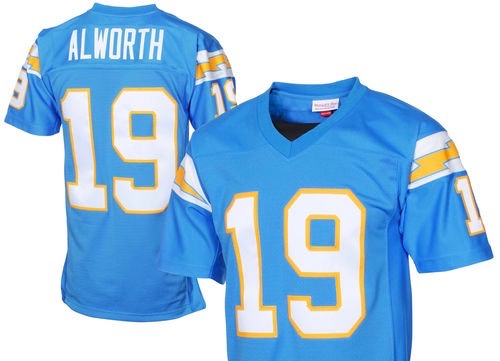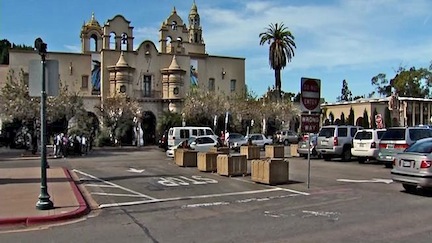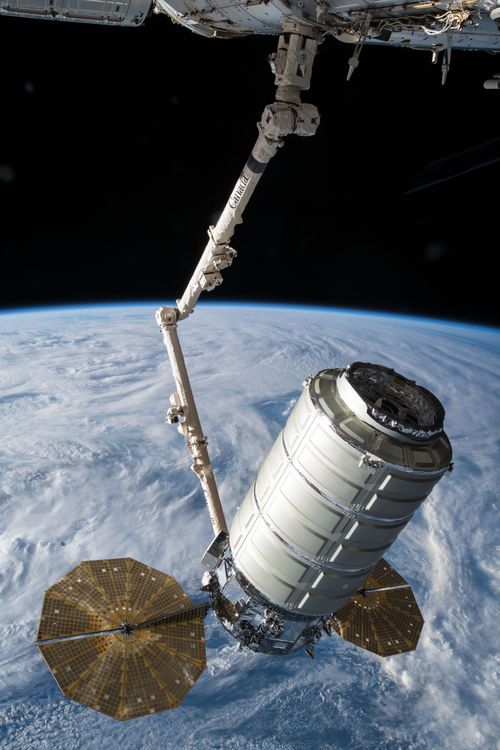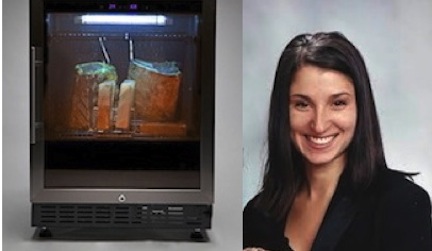Daily Business Report-Jan. 4, 2018
An old Lance Alworth Jersey when he was with the San Diego Chargers.
San Diego’s Economy is Fine Without the Chargers
— Some Businesses Aren’t so Lucky
By Jonah Valdez | Contributing Writer, Voice of San Diego
By the time the Chargers announced their relocation to Los Angeles, it was clear their departure wouldn’t have a significant effect on the region’s economy.
Even a study in favor of the 2016 ballot measure to build the team a downtown convadium by University of San Diego economics professor Alan Gin acknowledged the Chargers’ overall output in the region made up only “half of a tenth of a percent” of the region’s economy.
“It’s just a tiny fraction,” Gin said.
But despite the team’s minor impact on San Diego’s economy as a whole, specific small businesses that relied on the Chargers—sports bars, apparel stores, catering businesses, and a meat market—say they’ve been hit with hefty losses since the team skipped town.
“You can say the fans will go out and spend the money elsewhere in the economy, and then other businesses will benefit,” Gin said. “But those businesses attached to the Chargers have probably suffered some harm.”
“That Momentum is Gone”
Inside the Chula Vista sports apparel store Touchdown, Chargers jerseys with large red tags listing “50% OFF” hang above the cash register. A rack of Chargers T-shirts sits toward the back of the store with a $5 sign poking out on top. Even with the discounts, store owner Mihir Patel said he’s struggling to sell his Chargers gear.
“A major part of revenue is gone,” Patel said. “And people are angry at the [Spanos] family and people are taking it out on us.”
In the last year, Patel saw sales drop 25 to 30 percent. In February, he decided to close his second location at the Otay Ranch Town Center. With the falling sales, he said he wouldn’t be able to pay the rent. Several employees lost their jobs as a result of the closure.
Philip Canedo and Rosa Lopez, owners of Eazy Toyz, another sports apparel store in Chula Vista, started to notice a gradual sales decline when the Chargers announced their interest in relocating to Los Angeles in 2015. Their overall sales have now fallen 25 percent.
“It’s plummeted. It’s on the ground,” Canedo said.
Lopez and Canedo said falling sales have affected even the small things: using only half of their lights, limiting air conditioner use, putting renovations on hold.
Chargers jerseys hang in more dimly lit areas of the store, a vestige to more profitable times.
Before the Chargers left, Lopez said fans would stop by during the week leading up to home games to buy gameday gear, whether a T-shirt to wear at home or a flag to fly while tailgating at the stadium.
“Now that’s all gone. That momentum is gone,” Lopez said. “Sunday comes and it’s not like a regular football season here in San Diego anymore.”
Gameday Economy
Counting the losses in the restaurant and bar industry is not as easy.
Tilted Kilt in Mission Valley closed its doors on Sept. 8, days before the Chargers kicked off their season. In a statement, the company said the Chargers’ absence was a contributing factor. The statement also cited “changing demographics” and “declining mall traffic,” which retail experts say is a more likely culprit.
Sean Walchef, owner of Cali Comfort BBQ in Spring Valley, said gameday revenues are down 30 percent. An outspoken advocate for Measure C before the 2016 election, Walchef met with Dean Spanos, Mark Fabiani and Mayor Kevin Faulconer during the Save Our Bolts campaign. Walchef used to cater various events for the Chargers, and Chargers memorabilia still decorates his store’s walls—pictures of the 1980s Air Coryell days, mementos from the Bolt Pride fan group. He said his unabashed support for the team despite its exodus north has turned some customers away, though he’s still seen growth in his business.
“We’re not trophies,” he said. “We have great food and awesome barbecue and we do things to give back to community. The Chargers and everything else is a bonus on top.”
Ian Linekin, managing partner at McGregor’s Grill and Ale House in Mission Valley, said the business has been successful despite the team’s absence.
“There was a lot of negativity in the air that San Diego was going to suffer when the Chargers leave, and I find it to be quite different,” Linekin said. He misses the windfall from gamedays, but said SDSU football games and concerts at the former Chargers stadium have filled the void.
Oggi’s Pizza & Brewing in Mission Valley, once partners with the Chargers and a short drive from the stadium, hasn’t fared so well.
The restaurant’s on-hold message still features former Chargers running back LaDainian Tomlinson, a reminder of the former gameday enthusiasm: “I hope you’re ordering Oggis for Sunday football games. I know you’re hungry, but I’m telling you, it’s definitely worth the wait!”
Since the start of football season, sales have dropped 10 to 13 percent, said Connie Jones who manages the Oggi’s Mission Valley site.
“It’s 100 percent the Chargers not being here,” she said. “I think overall the NFL has taken a hit. As far as our location, it brought people into the area. You would come here before and after the game.”
Oggi’s in Eastlake has seen similar losses.
“This is considered a Chargers bar, so it was filled every time the Charges played,” said Victoria Martinez, an Oggi’s employee. “Now it’s a lot more quiet. We don’t have as many Chargers fans anymore, maybe a couple tables, but nothing like it used to be.”
Less obvious places like meat markets and catering companies that once served the team’s tailgating culture have also been grappling with the loss of the Chargers.
Fans on their way to the stadium would often pick up tailgating supplies at Santa Fe Meats, a carniceria in Chula Vista.
“One guy used to order two dozen hamburgers, a dozen New York Steaks, and a dozen rib eyes” said Peter Salmu, one of the owners. Those once-loyal patrons stopped coming. Since the start of the season, Salmu has seen sales drop 20 percent.
BBQ 81, a barbecue catering business, used to cook on site among hordes of RVs and folding tents in the former Qualcomm Stadium parking lot. Brandon Jessi, the company’s owner and a former NFL tight end for the New York Giants, would also cater parties centered around Chargers games. He had done this for the past 18 years.
“Now, I’m not getting shit,” Jessi said. “It’s a good 25 grand per season that I lost. Small businesses depend on that kinda stuff.”
Reinvention and Improvisation
Reinvention is the only way for some of these business to survive.
Eazy Toyz owners Lopez and Canedo said they are trying to sell to SDSU and Raiders fans, and shifting to an “urban streetwear” consumer base.
“We gotta change it up now. Everything’s changing and everything’s evolving and we have to get with whatever is current,” Lopez said.
They are partnering with local businesses along Third Avenue in Chula Vista to promote their shop. They remain a large presence during local car shows. Recently, they hosted a meet-and-greet with a local musician. In November, Chula Vista Brewery started to brew a beer named after Eazy Toyz, “Eazy Street Pale Ale.”
“We’re doing more now just to survive. But we’re not moving ahead as far as like gaining from it,” Canedo said.
Lopez said about four months ago, she had to get a second job.
“Now you have to get the whole family aspect. Your kids—having somebody pick up your kids, dropping them off, getting home late.” Lopez said. “We’re not gonna give up yet.”
(This article originally appeared in Voice of San Diego)
_________________________
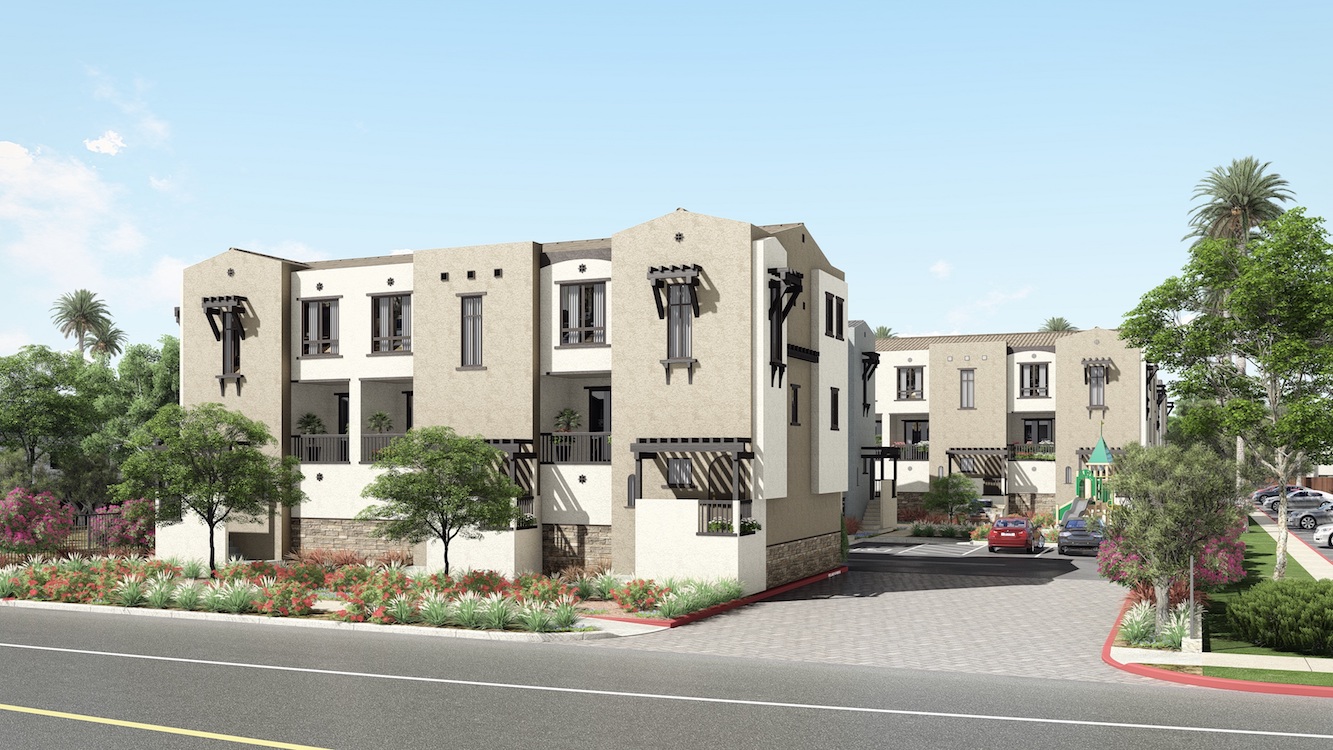
Sales Open for Townhomes
at Montivo in Santee
San Diego homebuilder New Pointe Communities’ 18-townhome project, Montivo, located at 8850 n Olive Lane in Santee, is now open for sales, the company announced Wednesday. Montivo is currently under construction, with completion expected in summer 2018 for phase one and fall 2018 for phase two.
The three-bedroom, three-bath townhomes at Montivo include approximately 1,300 square feet of living space and range from $459,990 to $469,990. Each home features a study, a two-car garage, nine-foot ceiling heights, a private deck, storage space, a 2.0 kW DC photovoltaic solar array and CATV in the great room, all bedrooms and the study. Community features include a tot lot, a barbecue and picnic area and striking Mediterranean architecture.
“We love this location and this project,” said Scot Sandstrom, president of New Pointe Communities. “We’re creating homes for families that want a close connection to their community but also value having a peaceful, well-appointed retreat to call home.”
Interested homebuyers can visit the sales trailer Monday through Friday from 10 a.m. to 5 p.m., located on the vacant lot adjacent to Montivo. Call (619) 871-8648 or visit https://montivotownhomes.com/.
_________________________
Carl Vinson Strike Group Prepares
for Deployment on Friday
The Carl Vinson Strike Group is scheduled to depart San Diego for a regularly scheduled deployment to the Western Pacific on Friday.
The strike group’s 6,000 sailors will depart aboard aircraft carrier USS Carl Vinson, guided-missile cruiser USS Lake Champlain and guided-missile destroyers USS Michael Murphy and USS Wayne E. Meyer.
The Carl Vinson Strike Group previously completed a six-month deployment to the Indo-Pacific region last June and was the first in recent history under U.S. 3rd Fleet’s command and control. The strike group will again operate under the command and control construct called Third Fleet Forward.
Michael Murphy is based in Hawaii and will later join the strike group as it transits toward the Western Pacific.
_________________________
Gut Reaction: Repeated Food
Poisoning Triggers Chronic Disease
A startling discovery published Dec. 21 in the journal Science reveals how your past history of minor bacterial infections can add up with age to cause a severe inflammatory disease.
Small bacterial infections that may go unnoticed and which the body easily clears without treatment, such as occurs during mild food poisoning, nevertheless can start a chain of events that leads to chronic inflammation and potentially life-threatening colitis. These new findings may also help identify the long–mysterious origins of inflammatory bowel disease (IBD).

